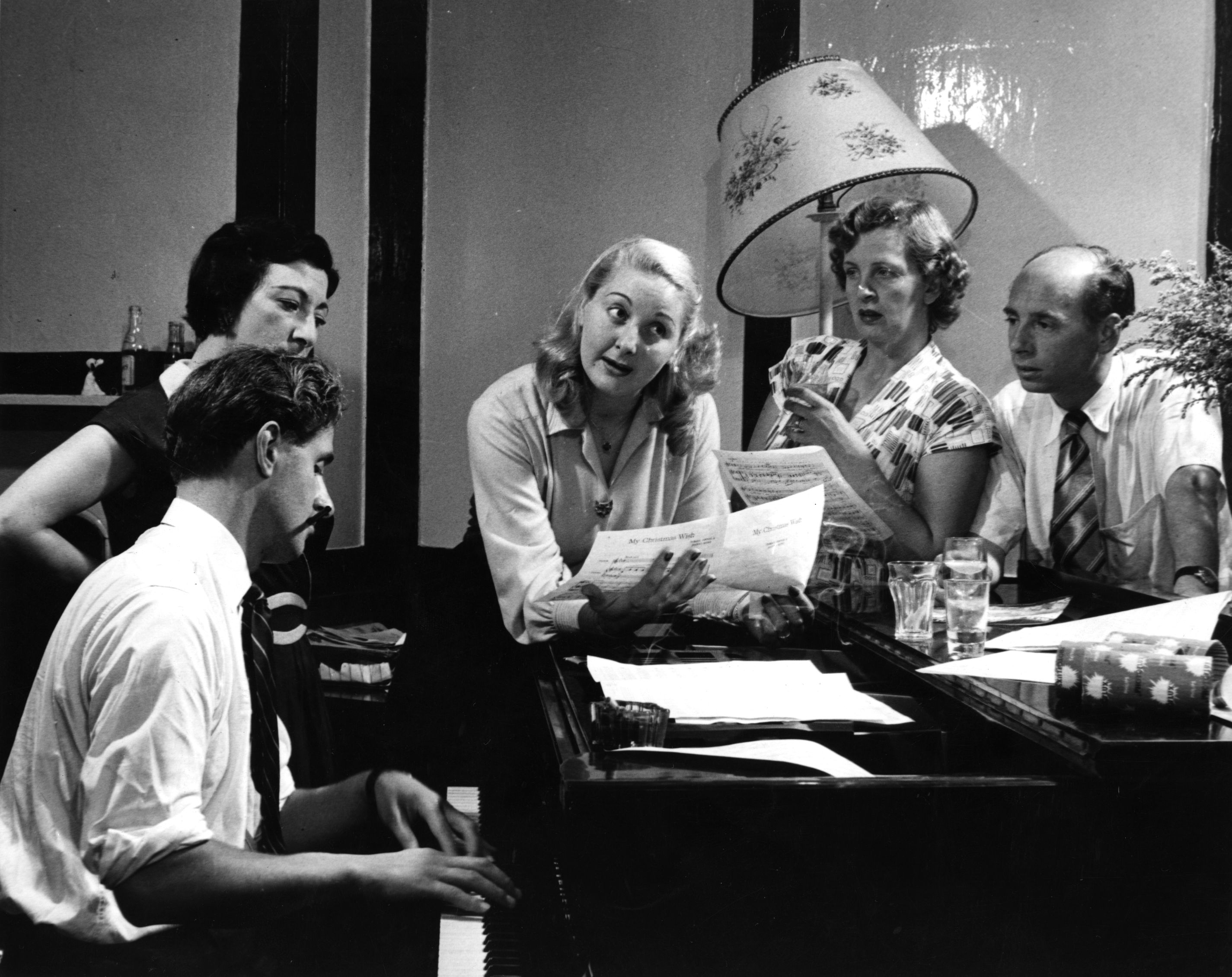7 Tin Pan Alley songs that deserve resurrection
The sheet music of Tin Pan Alley was the Spotify of the late 19th century


It's hard to believe that if our great grandparents wanted to enjoy a popular song, they had to know someone who could play piano. Sheet music, the product of the famous Tin Pan Alley, was king in the late 19th and early 20th centuries, due to ease of printing and lack of other personal audio entertainment. The New York Public Library has collected reams of these once popular tunes, some of which are begging for a second look.
*Note — Sexism and racism are rampant through this historical music collection. Though we omit them from our list (as best we can), be warned that turn of the century songwriters were brutally ethnocentric and found stereotypes hilarious.
1. "The Tramp that Slept in Astor's Bed"
The Week
Escape your echo chamber. Get the facts behind the news, plus analysis from multiple perspectives.

Sign up for The Week's Free Newsletters
From our morning news briefing to a weekly Good News Newsletter, get the best of The Week delivered directly to your inbox.
From our morning news briefing to a weekly Good News Newsletter, get the best of The Week delivered directly to your inbox.
Composition and lyrics published in 1894 by Charles Lawlor (whose most famous hit "Sidewalks of New York" is covered here by Nat King Cole).
I am the tramp that slept in Astor's bed you see
When at the Station the Police envied me
As my name went on the blotter, there wasn't a single copper
A free daily email with the biggest news stories of the day – and the best features from TheWeek.com
Who wouldn't then change places there with me
John Garvey claimed he was simply tired. He didn't steal or upset anything, he just walked into one of the many bedrooms belonging to John Jacob Astor's New York Fifth Avenue mansion, took off all his clothes, and went to bed. He was almost immediately freed upon his arrest, his bail paid by newspapermen who wanted the story. He became a lovable anti-hero. When Astor, arguably the richest man in the world, had Garvey re-arrested on the grounds that he deserved stricter punishment, the American public stood on the side of the scrappy little tramp, immortalizing his adventure in this song. Unfortunately, it didn't save Garvey from eventually being sent to a mental asylum. John Jacob Astor, for his part, would not be remembered as a greedy villain. Instead he is remembered as the man who gave up his seat, possibly multiple times, on the lifeboats of the Titanic.
2. "The Husbands"
Composition by Julian Edwards and lyrics by Stanislaus Stange, 1894
Husband number four was an Irish Mick
He was woo'd and won with the help of a stick
Home Rule he advocated, until he married me
Then the question we debated, and Ireland was Free!
"The Husbands" was a song in the comic opera Madeleine, or, The Magic Kiss. The opera itself was a sweet comedy about a man who grew younger every time he was kissed. This song, however, is anything but sweet. I can't say why the woman singing this song needs to kill these six husbands, all with different nationalities who die singing praises to their homeland. It really seems she may have some geopolitical issues to come to terms with. It was a very tumultuous time in history.
3. "Pat Malone Forgot That He Was Dead"
1893, lyrics by Harry C. Clyde, composed by Jas. J. Sweeney.
And so Pat lay down and tried to make out that he had died.
Until he smelt the whiskey at the wake;
Then Pat Malone forgot that he was dead;
He raised himself and shouted from the bed:
"If this wake goes on a minute, the corpse he must be in It;
You'll have to get me drunk to keep me dead."
It was an ingenious idea in a time before autopsies and embalming. Down to your last dime but well insured? Throw yourself a marvelous wake, where all your loved ones wail and drink whiskey over your corpse. Then your "widow" picks up the insurance money, and off the two of you go to a better life. Of course this plan can go terribly wrong, especially if you (the deceased) and your friends enjoy said wake a little too intensely.
4. "When Reuben Comes to Town"
1900, lyrics by John Cheever, composed by Levi Maurice
Next morning with a wallet pack'd with many juicy 'V's
You've heard of wallets just like that before
Reuben started for a saunter up Broadway, the sights to see
You've heard of saunters just like that before
A perfect lady met him, who alas had lost her way
You've heard of ladies just like that before
Would Reuben as a favor see her home to avenue A
You've heard of favors just like that before
Have you ever wondered why we call certain innocents "rubes"? At the turn of the 19th century the name "Reuben" had the same connotations that "Cletus" or "Billy Bob" have today. A country boy. A total rube. No doubt this song, made famous by the popular singer S.H Dudley (and not, as many suppose, by the African-American performer of the same name and era, Sherman H. Dudley) helped the association. This song is the story of Reuben going to the big city to see the sights, and falling for every scam and malfeasance that hurries to cross his path. A copy of this as sung by Dudley is available to hear, though it appears the wrong Dudley is credited.
5. "Mary's Not as Green as She Looks"
Composed in 1897 by John Bratton (mostly remembered for scoring the oddly disconcerting classic "Teddy Bear's Picnic").
Mary's not as green as she looks
Mary knows a lot that's not in books
She's demure as she can be
But you take a tip from me
Mary's not as green as she looks!
Though Mary gives every indication that she's a perfect lady, woe be to the man who falls for this young girl's charms. She's as sly as even the slickest of con men, wearing the perfect disguise of femininity. Caught short when the collection box is passed, a gentleman tries to aid her dignity by generously loaning her money. She apologizes for her faux pas and runs right out to find her purse to make change for him. And now all his friends greet him laughing with, "Has Mary paid you yet?" That's just one of Mary's crafty hi-jinks. As you can tell from the ribald flash of ankle on the cover, Mary's not as green as she looks.
6. "Our Language As It's Spoken"
1898, composed by Frank Isenbarth with lyrics by George Day
When evening comes you sit and smoke beside your cheerful fire
You feel at peace with all the world, when ready to retire...
The horrid noise gets worse and worse, It seems to travel nearer
And then this great intelligence is given to the hearer:
"Extry Extra-a-a! Fu' ‘coust terr'ble oss er life un Ocean Steam'r!
Hor'ble mur'er! Whoa-de extra-a-a!"
We have sound recordings from as long ago as 1898, even from much earlier. But they are usually very particular, careful recordings, whether they be songs or dialogue, since no one wanted to use such an important medium to frivolous effect. Likewise, most books don't give a true idea of how people actually spoke in eras past. That's the charm of "Our Language As It's Spoken" — not only a cheerful ditty about the frustrations of hearing English mangled in daily use, but a precise transcription of that mangling, just as it existed in the 19th Century. Turns out Grandmas have always been helpless against "Cootchie cootchie 'ittie footsie tootsies."'
7. "Living Pictures"
1894, lyrics and composition by James Thorton
The next represented Adam and Eve,
They were dressed up in fig-leaves, that's all,
I shouted, "Hooray!" but someone did say,
"Oh, throw him out of the hall."
The art form of tableaux vivant ("living picture") is ancient. It has been used throughout history in religious ceremonies, art appreciation, and historical edification. It even continues today, having a very prominent part in Laguna Beach's Festival of the Arts (yeah…that Arrested Development episode). It was also an acceptable way to see mostly naked ladies in even the most straight-laced of eras. By having the models, often depicting erotically tinged historic scenes, hold perfectly still, less-than-respectable establishments were able to bypass indecency laws. It is to this sort of living picture show that our hero stumbles into.
Therese O'Neill lives in Oregon and writes for The Atlantic, Mental Floss, Jezebel, and more. She is the author of New York Times bestseller Unmentionable: The Victorian Ladies Guide to Sex, Marriage and Manners. Meet her at writerthereseoneill.com.
-
 The Beckhams: the feud dividing Britain
The Beckhams: the feud dividing BritainIn the Spotlight ‘Civil war’ between the Beckhams and their estranged son ‘resonates’ with families across the country
-
 Quiz of The Week: 24 – 30 January
Quiz of The Week: 24 – 30 JanuaryQuiz Have you been paying attention to The Week’s news?
-
 The Week Unwrapped: Why is China clearing out its generals?
The Week Unwrapped: Why is China clearing out its generals?Podcast Plus, can the Conservatives win back the centre? And what’s gone wrong with Britain’s hearing aids?
